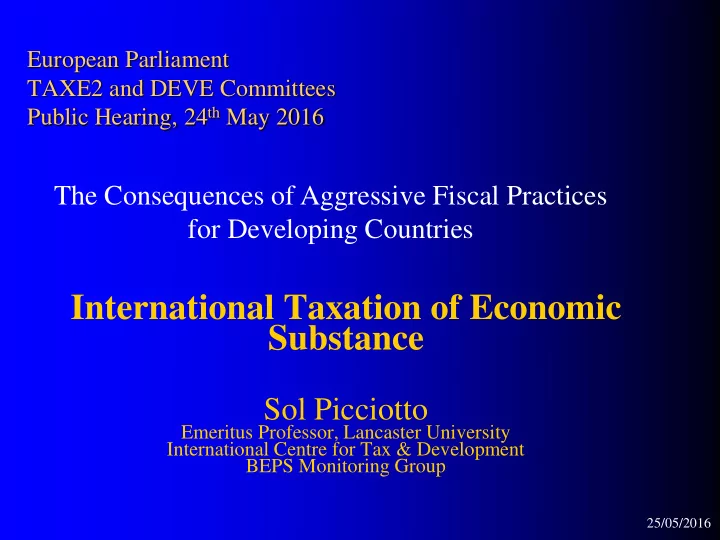

European Parliament TAXE2 and DEVE Committees Public Hearing, 24 th May 2016 The Consequences of Aggressive Fiscal Practices for Developing Countries International Taxation of Economic Substance Sol Picciotto Emeritus Professor, Lancaster University International Centre for Tax & Development BEPS Monitoring Group 25/05/2016
Flaws in the System & Responses Treaty principles allocating tax rights Portfolio investment: active income @ source, passive returns @ residence MNEs: power to adjust, but based on ‘independent entity’ principle no obligation to tax, may exempt MNE exploitation of independent entity principle Traditional: ‘stepping - stones’ deductions for fees/royalties/interest flow through tax-exempt conduit to base Newer: corporate value-chain fragmentation ‘stripped risk’ production/R&D/distribution in high -tax countries ‘high - value’ control/design/management functions where low-taxed State Competition to Attract ‘High - Value’ Functions Exemption of foreign income Special rulings CFC rules abandoned, ‘territorial’ taxation The BEPS Project: G20 Mandate Tax MNEs ‘where economic activities occur and value is created’, ‘ while … respecting the sovereignty of each country to design its own rules ’ Contradictory 2 25/05/2016
BEPS Project Outcomes Deductibility of central costs services: ‘low value’ may be apportioned subject to benefit test interest: cap @ 10-30% of EBITDA optional GRR for 20% of MNEs disadvantaged Anti-Treaty Abuse Who can be bona fide resident? Investment funds? LoB: even modified version is complex PPT: hard to apply, especially if recipient has (some) substance Profit Allocation - Transfer Pricing Guidelines Functional Analysis Intangibles: R&D ‘design and control’, ‘ direction of and establishing priority ’, ‘management and control’ (para. 6.56), Risk: ‘capability and authority to control’ (para. 1.67 ) ‘stripped risk’ affiliate still gets routine profits (Google UK settlement) Can ‘cash box’ show it fulfils control functions? 3 25/05/2016
Responses Unilateral ‘anti - abuse’ measures Diverted Profits Tax: UK, Australia if payments made to low-taxed recipient ‘Reform’ of Conduit Regimes NL ‘substance’ requirement: 50% resident Board members, meetings in country Pressures on source countries Inclusion of (optional?) arbitration in treaties – NL Uganda-NL MAP over Zain/Bharti case modification of anti- abuse test for conduits to add ‘substance’ Uganda – 2016 amendment to ITA 88(5) Restricting Harmful Tax Practices? Forum now global, peer- review includes ‘relevant’ countries Key test is ‘substance’, developed for Patent Box, to be extended ‘reformed’ regimes will be generalised Patent Box: UK >> Ireland, Switzerland >> Germany, USA 4 25/05/2016
Problems for Developing Countries Ad Hoc & Discretionary Methodology ‘capacity building’ may generate increased revenues but is it suitable for all, or sustainable in the long-term? Alternative Approaches Brazil: fixed margins: easy to administer, but blunt instrument Safe Harbours OECD version: taxpayer’s option Durst – ICTD WP 44 Modified Net Margin Method Benchmark Affiliate’s profit as % of Group profit rate – pre-tax revenue minimum of e.g. 25% of sales or of costs Different type of Safe Harbour Simple, easy to administer, comprehensive solution 5 25/05/2016
Muchas Gracias Ahsante Sana Dank u Wel Vielen Dank Thank You Obrigado Merci 6 25/05/2016
Recommend
More recommend